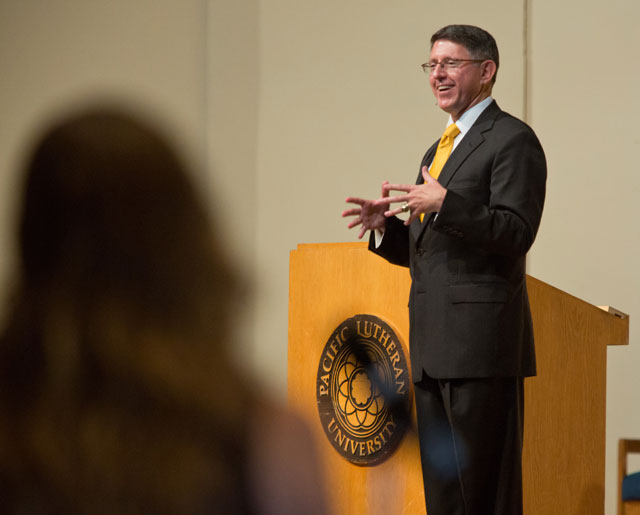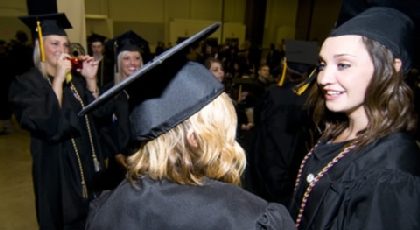Page 34 • (559 results in 0.085 seconds)
-
Originally published in 1999 My lifelong commitment to the liberal arts took root in the fourth grade, when I met my classmate and dear life-long friend Sally. During that entire year, Sally rode her bike to my house, and after school, we both rode our…
Humanity: A Classical Defense of Reform in Liberal Education (1997), 297 IntroductionAcademic Animals: Making Nonhuman Creatures Matter in Universities Read Previous Locating Humanities in the 21st Century Read Next Introduction LATEST POSTS Gaps and Gifts May 26, 2022 Academic Animals: Making Nonhuman Creatures Matter in Universities May 26, 2022 Gendered Tongues: Issues of Gender in the Foreign Language Classroom May 26, 2022 Introduction May 26, 2022
-

Associate Professor of Biology Jacob Egge works with students during a summer semester research project. (Photo by PLU Photographer John Froschauer) Faculty-Student Research Provides a Cornerstone of the PLU Mission By Pacific Lutheran University Marketing & Communications and the Office of the Provost This year’s…
University Center. This event will feature research projects from the three divisions of the College of Arts and Sciences—Humanities, Natural Sciences and Social Sciences. The posters, articles and videos on display will provide a window onto activities that are at the core of Pacific Lutheran University’s mission: scholarship and student learning. These projects make visible what too often is invisible: the intellectual activity that is central to discovery, interpretation and artistic production
-

More than a century after PLU was founded by Norwegian immigrants, the university maintains its connection to the founders’ homeland through study away programs.
said. “We really want students to get the best out of the semester with us.” The program isn’t just targeted to international relations or communication students. The curriculum pulls from many different academic disciplines. “We are all over the humanities and the social sciences, basically,” said Restad, who taught “Terrorism and Counterterrorism” in the fall. The other classes students chose from last semester included “Introduction to Migration” and “International Political Thought.” “We’re
-
Originally Published 1996 Introduction Like other disciplines such as English and Sociology, Foreign Languages also have a history in the United States which is linked to the changing values of society as a whole. The discipline of foreign language teaching has evolved over the last…
feminist research yet to be undertaken. Locating Humanities in the 21st CenturyGaps and Gifts Read Previous Introduction Read Next Academic Animals: Making Nonhuman Creatures Matter in Universities LATEST POSTS Gaps and Gifts May 26, 2022 Academic Animals: Making Nonhuman Creatures Matter in Universities May 26, 2022 Introduction May 26, 2022 The Pragmatism of the Liberal Arts May 26, 2022
-
Membership: Three members elected from the faculty for three-year overlapping terms. Advisory Membership: Provost; dean of students; a representative from the Office of Student Rights and
members elected from the faculty for three-year overlapping terms with the provision that the committee be comprised of one member chosen from the College of Humanities, Interdisciplinary Studies, and Social Sciences; one member chosen from the College of Natural Sciences; and one member chosen from either the College of Health Professions or the College of Professional Studies. Advisory Membership: Director of first year experience program; director of international honors program; director of core
-
Important text: None Major holidays: Human Light Major figures in this tradition: Enlightenment Scholars, scientists Place of worship: None Brief Summary: Humanists believe in the importance of
of life (kama), and moksha. To learn more: Crash Course Buddha and Ashoka https://www.khanacademy.org/humanities/art-asia/beginners-guide-asian-culture#hindu-art-culture Books available at the PLU library: Click here for the library guide to Hinduism Hindu wife, Hindu nation, community, religion, and cultural nationalism, by Tanika Sarkar HumanismHumanismImportant text: None Major holidays: Human Light Major figures in this tradition: Enlightenment Scholars, scientists Place of worship: None
-

PLU President Thomas W. Krise welcomes faculty and staff back to campus, highlighting the strengths of PLU and his goals for the future. (Photo by John Froschauer) “A University of the First Rank” By President Thomas W. Krise Good morning and welcome to the 2012…
—and at least four of those seven medieval liberal arts are what we would now call scientific. We have a popular misunderstanding in the United States that the liberal arts subjects are only the humanities and social sciences, and even some universities establish structures that suggest that the liberal arts do not include the sciences. So, we need to emphasize to potential students and others that a liberally educated person must know the sciences and be able to think scientifically to solve
-
8:15 a.m. | March 8 | Karen Hille Phillips Center for Performing Arts Who: Bob Ferguson Title: Washington State Attorney General Bio: Bob Ferguson is Washington State’s 18th Attorney
literature, and digital humanities. She is a recipient of PLU’s Faculty Excellence Award in Teaching (December 2016). Who: Jennifer Spence Title: Visiting Instructor of Anthropology at Pacific Lutheran University Bio: Jennifer recently earned her Ph.D. in biological anthropology from Ohio State University. Before teaching at Pacific Lutheran University, she lived in northern Brazil for several years while conducting dissertation fieldwork. Her current research focuses on how a mother’s circumstances
-

In their own words By Chris Albert Soon new PLU graduates will go out into the world. In the following, some Lutes share their stories of why they came to PLU, what their experiences have been and what’s the next chapter in their lives. More…
, since junior high and high school, during Running Start, and well into my community college years, I had frequently used the PLU library for research and personal enrichment. As a result, I began to wonder what a it would be like to be a student of the university that this library belonged to and, as such, I have come to enjoy knowing what it means to be a student such as that. My PLU experience: My experience at PLU is two-fold; for one who majors in both the Humanities and the Social Sciences must
-
See Dr. Artime's profile Michael Artime is Assistant Professor & Chair of the Department of Political Science. He has a Ph.D. from the University of Missouri-St. Louis in Political Science.
limitations of language in conveying pain. She is currently working with Division of Humanities colleague Dr. Kaufman in a project involving Holocaust survivors and relatives living in Uruguay.COURSE DELIVERY AND SCHEDULING DETAILS This course will use Zoom as its virtual platform for weekly lectures and discussion. Additionally, students taking the course for credit will use SAKAI for accessing course materials and submitting assignments. A Zoom link and a password to the course will be made available to
Do you have any feedback for us? If so, feel free to use our Feedback Form.


